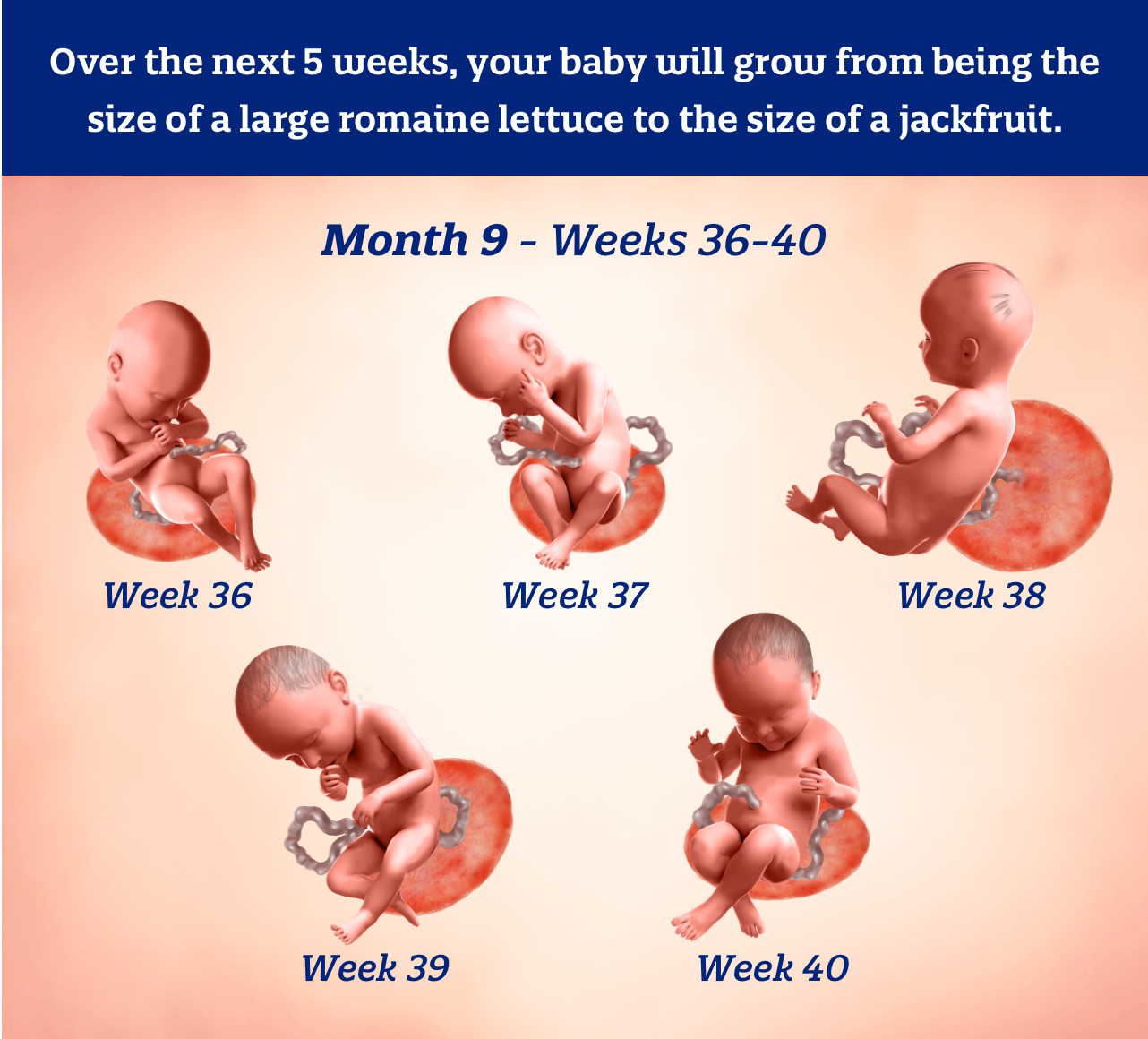Due to maintenance, rewards points for receipt uploads will be delayed. Thank you for your patience!

You're about to welcome your baby to the world. Here's what you might expect at nine months pregnant.
Congratulations! At nine months pregnant, your baby’s arrival could happen any day. As the main event approaches, you may feel a mix of excitement and nervousness while you anticipate the moment you've been waiting for. From false labor to actual labor contractions, let's take a look at some of what you may be experiencing as you prepare to hold your little one in your arms for the first time.
Braxton Hicks contractions feel like sporadic tightening sensations across the stomach muscles. They may last from 15 seconds to two minutes and may sometimes be mistaken for true labor. Dehydration, sex, a full bladder, or high activity levels may trigger these intermittent and unpredictable contractions, also known as “false labor.” Drinking water, changing position, and resting may help them stop. At nine months pregnant, however, keep an eye out for true labor contractions, which will increase in frequency and get progressively stronger.
Moms-to-be may experience lightning crotch, a sharp, shooting pain or pins-and-needles sensation in the vagina, rectum, or pelvis that may travel to the thigh. It lasts a few seconds and isn't an indication of labor but may be connected to nerve pressure caused by your baby's head, which is positioned lower in your pelvis now. Unfortunately, there's not too much you can do about it except wait it out, although changing positions may help lessen the baby's pressure on your nerves. It is a good idea to call your doctor if it lasts longer than a few seconds.
Of course, the most wonderful part of being 9 months pregnant is that you're almost at that life-changing moment when you'll finally meet the precious baby who's been growing inside you. When will it be "time"? Typically women will go into labor between weeks 38 and 41 of pregnancy, but every mama has a different labor experience and each delivery is unique.
Here are some indications that labor may be on the way. If you experience any of the following, contact your doctor, who can best guide you through your next steps.
Giving birth is an emotional experience, so it’s understandable if you're feeling a little nervous. You may be concerned about labor, your baby's health, or how your life will change with your newest family member. Talking to family and friends may help provide some reassurance and ease some of your anxieties. Consider keeping a journal of your feelings, taking a walk, meditating, and resting when you need to. If you're feeling overwhelmed, reach out to your healthcare provider for support.
On the flip side of anxiety is anticipation. At 9 months pregnant, your excitement may be kicking into high gear. Perhaps you're in nesting mode and busy organizing your home. Or maybe you've started reading parenting books and looking for birth announcement ideas. Try to relax and enjoy this final phase as much as you can. You've been through a lot! After all the waiting, body changes, and doctor appointments, you'll soon be bonding face-to-face with your bundle of joy.
Throughout your ninth month, frequent urination, leg cramps, varicose veins, colostrum leaks, and back pain may continue to be issues. Try to be patient and stay positive. Take some time for yourself. Delivery day is on the horizon, and while you're just about done with this miraculous pregnancy milestone, your next amazing journey is just beginning.
At 9 months pregnant, your belly will be about watermelon-size. But as your baby's head moves into your pelvis to get ready for birth, your abdomen may look lower and you may feel lighter.

Your baby's lungs are developed for making the sweetest sound: that first big cry. Their reflexes are getting ready to respond to your voice and all the new sounds and sights they will soon be discovering. While a fetus at 9 months pregnant may move less as there's not much wiggle room left in the womb, your little one should be making their way into the heads-down position, preparing for their grand entrance. Newborn baby sizes vary, but they are typically the size of a pumpkin.
All information on Enfamil, including but not limited to information about health, medical conditions, and nutrition, is intended for your general knowledge and is not a substitute for a healthcare professional's medical identification, advice, or management for specific medical conditions. You should seek medical care and consult your doctor or pediatrician for any specific health or nutrition issues. Never disregard professional medical advice or delay seeking medical treatment, care, or help because of information you have read on Enfamil.